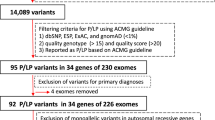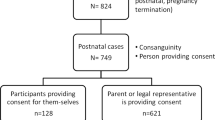Abstract
CES (Clinical Exome Sequencing) is a method that we use to diagnose rare diseases with nonspesific clinical features. Besides primary indication for testing genetic information may be detected about diseases which have not yet emerged. ACMG guidelines recommend to report pathogenic variations in medically actionable 59 genes. In this study we evaluated CES data of 622 cases which were tested for various indications. According to ACMG recommendations 59 genes were screened for reportable variations. The detected variations were reviewed using distinct databases and ACMG variation classification guidelines. Among 622 cases 13 (2.1%) had reportable variations including oncogenetic, cardiogenetic disorders, and malignant hyperthermia susceptibility-related genes. In 15 cases (2.4%) heterozygous pathogenic and likely pathogenic variations were detected in genes showing autosomal recessive inheritance. Ten novel variations causing truncated protein or splicing defect were reported. We detected 11 variations having conflicting interpretations in databases and 30 novel variations, predicted as likely pathogenic via insilico analysis tools which further evaluations are needed. As to our knowledge this is the first study investigating secondary findings in Turkish population. To extract the information that may lead to prevent severe morbidities and mortalities from big data is a valuable and lifesaving effort. Results of this study will contrbute to existing knowledge about secondary findings in exome sequencing and will be a pioneer for studies in Turkish population.
This is a preview of subscription content, access via your institution
Access options
Subscribe to this journal
Receive 12 print issues and online access
$259.00 per year
only $21.58 per issue
Buy this article
- Purchase on Springer Link
- Instant access to full article PDF
Prices may be subject to local taxes which are calculated during checkout



Similar content being viewed by others
References
Green RC, Berg JS, Grody WW, Kalia SS, Korf BR, Martin CL, et al. ACMG recommendations for reporting of incidental findings in clinical exome and genome sequencing. Genet Med. 2013;15:565–74.
Kalia SS, Adelman K, Bale SJ, Chung WK, Eng C, Evans JP, et al. Recommendations for reporting of secondary findings in clinical exome and genome sequencing, 2016 update (ACMG SF v2.0): a policy statement of the American College of Medical Genetics and Genomics. Genet Med. 2017;19:249–55.
Bezzina CR, Lahrouchi N, Priori SG. Genetics of sudden cardiac death. Circ Res. 2015;116:1919–36.
Olfson E, Cottrell CE, Davidson NO, Gurnett CA, Heusel JW, Stitziel NO, et al. Identification of Medically Actionable Secondary Findings in the 1000 Genomes. PLoS One. 2015;10:e0135193.
Tang CS, Dattani S, So MT, Cherny SS, Tam PKH, Sham PC, et al. Actionable secondary findings from whole-genome sequencing of 954 East Asians. Hum Genet. 2018;137:31–7.
Amendola LM, Dorschner MO, Robertson PD, Salama JS, Hart R, Shirts BH, et al. Actionable exomic incidental findings in 6503 participants: challenges of variant classification. Genome Res. 2015;25:305–15.
Dewey FE, Murray MF, Overton JD, Habegger L, Leader JB, Fetterolf SN, et al. Distribution and clinical impact of functional variants in 50,726 whole-exome sequences from the DiscovEHR study. Science. 2016;354:6319.
Karczewski KJ, Francioli LC, Tiao G, Cummings BB, Alfoldi J, Wang Q, et al. The mutational constraint spectrum quantified from variation in 141,456 humans. Nature. 2020;581:434–43.
Stenson PD, Mort M, Ball EV, Howells K, Phillips AD, Thomas NS, et al. The Human Gene Mutation Database: 2008 update. Genome Med. 2009;1:13.
Landrum MJ, Lee JM, Benson M, Brown GR, Chao C, Chitipiralla S, et al. ClinVar: improving access to variant interpretations and supporting evidence. Nucleic Acids Res. 2018;46:D1062–D1067.
Richards CS, Bale S, Bellissimo DB, Das S, Grody WW, Hegde MR, et al. ACMG recommendations for standards for interpretation and reporting of sequence variations: Revisions 2007. Genet Med. 2008;10:294–300.
Richards S, Aziz N, Bale S, Bick D, Das S, Gastier-Foster J, et al. Standards and guidelines for the interpretation of sequence variants: a joint consensus recommendation of the American College of Medical Genetics and Genomics and the Association for Molecular Pathology. Genet Med. 2015;17:405–24.
Kopanos C, Tsiolkas V, Kouris A, Chapple CE, Albarca Aguilera M, Meyer R, et al. VarSome: the human genomic variant search engine. Bioinformatics. 2019;35:1978–80.
Kwak SH, Chae J, Choi S, Kim MJ, Choi M, Chae JH, et al. Findings of a 1303 Korean whole-exome sequencing study. Exp Mol Med. 2017;49:e356.
Prevalence and penetrance of BRCA1 and BRCA2 mutations in a population-based series of breast cancer cases. Anglian Breast Cancer Study Group. Br J Cancer. 2000;83:1301–8.
de la Chapelle A. The incidence of Lynch syndrome. Fam Cancer. 2005;4:233–7.
Jalkh N, Mehawej C, Chouery E. Actionable Exomic Secondary Findings in 280 Lebanese Participants. Front Genet. 2020;11:208.
Van Laer L, Dietz H, Loeys B. Loeys-Dietz syndrome. Adv Exp Med Biol. 2014;802:95–105.
Litman RS, Griggs SM, Dowling JJ, Riazi S. Malignant Hyperthermia Susceptibility and Related Diseases. Anesthesiology. 2018;128:159–67.
Monnier N, Krivosic-Horber R, Payen JF, Kozak-Ribbens G, Nivoche Y, Adnet P, et al. Presence of two different genetic traits in malignant hyperthermia families: implication for genetic analysis, diagnosis, and incidence of malignant hyperthermia susceptibility. Anesthesiology. 2002;97:1067–74.
Colas C, Bonadona V, Baert-Desurmont S, Bonnet D, Coulet F, Dhooge M, et al. MUTYH-associated polyposis: Review and update of the French recommendations established in 2012 under the auspices of the National Cancer institute (INCa). Eur J Med Genet. 2020;63:104078.
Win AK, Jenkins MA, Dowty JG, Antoniou AC, Lee A, Giles GG, et al. Prevalence and Penetrance of Major Genes and Polygenes for Colorectal Cancer. Cancer Epidemiol Biomark Prev. 2017;26:404–12.
Figus A, Angius A, Loudianos G, Bertini C, Dessi V, Loi A, et al. Molecular pathology and haplotype analysis of Wilson disease in Mediterranean populations. Am J Hum Genet. 1995;57:1318–24.
Author information
Authors and Affiliations
Corresponding author
Ethics declarations
Conflict of interest
The authors declare no competing interests.
Additional information
Publisher’s note Springer Nature remains neutral with regard to jurisdictional claims in published maps and institutional affiliations.
Supplementary information
Rights and permissions
About this article
Cite this article
Arslan Ateş, E., Türkyilmaz, A., Yıldırım, Ö. et al. Secondary findings in 622 Turkish clinical exome sequencing data. J Hum Genet 66, 1113–1119 (2021). https://doi.org/10.1038/s10038-021-00936-8
Received:
Revised:
Accepted:
Published:
Issue Date:
DOI: https://doi.org/10.1038/s10038-021-00936-8
This article is cited by
-
Assessment of whole-exome sequencing results in neurogenetic diseases
Journal of Human Genetics (2023)



